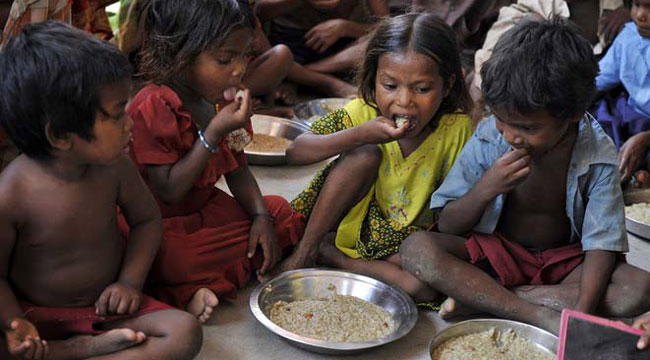World Food Day: Who Says Hunger Does Not Discriminate, It Does!
MANISHA SHASTRI

BENGALURU: October 16 each year is observed by as World Food Day by the Food and Agriculture Organisation (FAO) of the United Nations. Each year the FAO, its partners and organisations working on issues pertaining to food, observe this day in line with the theme decided by the FAO.
This year’s theme revolves around migration, investment in food security and rural development. The issues being raised are critical, given how many people have been forced to flee their homes since the Second World War due to increasing conflict and political instability, made worse by poverty, hunger and events linked to climate change.
Hunger poses a significant economic burden, on individuals and national economies, the cost of which in developing nations is estimated at $450 billion per year. Currently 1.3 per cent of the world’s population goes hungry, 60 percent of which are women. In 2010, it was estimated the 7.6 million children across the world died due to insufficient nutrition.
Recent numbers from the Global Hunger Index (GHI), point to a horror story unfolding in our backyard, with India having fallen 45 spots since 2014, faring much worse than Bangladesh, Sri Lanka and North Korea. Ranked third worst among all Asian countries, better only than Afghanistan and Pakistan, the index shows that more than a fifth of Indian children under the age of five are malnourished and weigh too little for their height. Currently, India ranks 100 out of 119 countries in the GHI.
As per the Index a score of 9.9 or lower is indicative of low hunger; a score between 35.0 and 49.9 denotes alarming hunger, and a score of 20-34.9 indicates 'serious' problem of hunger. India with a score of 31.4 falls under the category of ‘serious’ hunger problems; with figures of malnourishment, child stunting and child wasting having shown no progress in 25 years.
The Global Health Index ranks countries based on four key indicators of — undernourishment, child mortality, child wasting and child stunting; however if factors such as women’s health, access to food and food security were taken into consideration, India would perhaps fare even worse.
For a country pegged as one of the fastest growing world economies such a low ranking is a matter of shame and raises some serious questions.
In the light of the passage of the National Food Security Act, 2013, the stage for food security based on the principle of universal access should have been set and a these numbers could have shown some serious improvement had it not been for the lack of political will, corruption and poor social security and welfare systems in the country.
Despite being self – sufficient and one of the largest producer of grains, 25 percent of India goes to sleep hungry each night due to the lack of availability, accessibility and affordability of food. With the increase in crops failure due to droughts, farmer suicides, and the ongoing economic slowdown, these numbers can only be expected to become worse if not addressed immediately in a systematic and strategic manner.
The drum of development has been beaten loud and clear since the present government came to power at the Centre, however, their agenda of development seems to have overlooked and ignored human development – for which food security is one of the several parameters.
The fall of 45 spots on the Global Hunger Index in a span of less than three years, shows the monstrosity of the problem being faced by the country, however, there has been no immediate response to the report. It appears as though the country is working backwards rather than forward to rid itself of undernourishment by 2022, for which a National Action Plan also has been put in place.
Not only does India need to address access to food for migrants and the lack of food security, it needs to also get its ideas towards rural development in place. Digital India and StartUp India are not going to fill people’s stomach or ensure food security; a more targeted and well rounded strategy needs to be developed to address the growing problem of hunger in the country.
India has been working closely with the Food and Agriculture Organisation towards Food Security, which is not only an implementer of projects but also a knowledge partner providing inputs into existing technologies and approaches while also addressing challenges of livelihoods and access to food by poorer communities, sustainability of water and natural resources.
While, the Food and Agricultural Organisation, may be hailed as an international organisation working on issues pertaining to food and food security the drop in India’s ranking on the Global Hunger Index reflects not only the failure of the Indian government, but also the failure of the FAO since despite collaborations with it the numbers have only grown worse.
While the world over groups and organisations may hold talks, rallies and observe World Food Day today, several individuals in India and across the world are going to remain hungry, reducing such events to nothing but tokenism, which has no actual impact on people’s life and realities.



